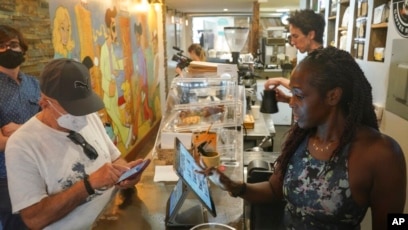U.S. inflation moderates in August, but remains high:
Washington — The U.S. government said on Tuesday that U.S. consumer price gains slowed in August compared with a year ago, but the decline was modest and cash-strapped U.S. households may not notice.
The U.S. Bureau of Labor Statistics reported that inflation rose at an annualized rate of 8.3% in August. The figure was lower than inflation of 8.5% in July and 9.1% in June, the largest increase in 40 years.
While U.S. car owners have been delighted to see gasoline prices plummet in recent weeks — down 10.6% from their peak — the cost of food and apartment rentals has continued to rise.
Overall, consumer prices rose 0.1% in August compared with July, the government said.
Food prices rose 0.8% over the past month, while the cost of housing, medical care, new cars and household goods all rose in August relative to July.
U.S. stock investors remain concerned about inflation, with the major indexes down more than 2 percent at the open on Tuesday, an hour after the inflation report.
President Biden remained optimistic, saying: “In general, prices in our country have been roughly flat for the past two months. This is great news for American families, and there is more work to be done.”
He said: Gasoline prices have fallen by an average of $1.30 per gallon since the beginning of summer. This month, we saw price increases in grocery stores moderate from the previous month. Real wages rose for the second straight month, giving hard-working families A little breathing room."
Mark Hamrick, senior economic analyst at Bankrate.com, said in a statement: "Prices of essentials including housing, food and health care continue to swell on the fire. The sharp drop in oil. Gasoline prices is noteworthy but does not address the overall inflation issue.”
Hamrick said: “The report noted that the food price index has risen 11.4% over the past year, the most since May 1979. Biggest 12-month gain." The
U.S. central bank, the Federal Reserve, has raised its benchmark interest rate four times this year and said it plans to raise rates again when Fed officials meet next week, with further hikes possible later this year.
The rate hikes have affected every aspect of the U.S. economy, raising borrowing costs for businesses and consumers, and the Fed hopes the rate hikes will reduce consumer demand and thus curb inflation.
Federal Reserve Chairman Jerome Powell said earlier this year, “Inflation is too high, and we understand the difficulties it creates. We are moving quickly to bring inflation down.”
Even with high inflation, the U.S. economy, the world’s largest, has seen businesses across Hundreds of thousands of new jobs are still being added month-over-month, while the national unemployment rate of 3.7% in August was near a 50-year low.
All jobs lost after the coronavirus pandemic swept across the country in March 2020 have been restored.





0 Comments